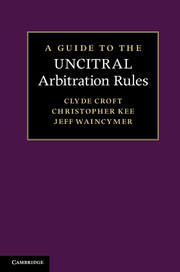Book contents
- Frontmatter
- Contents
- Preface
- Foreword
- Introduction
- Section I Introductory rules
- Section II Composition of the arbitral tribunal
- Section III Arbitral proceedings
- Section IV The award
- APPENDIX 1 United Nations Commission on International Trade Law (UNCITRAL)
- APPENDIX 2 Recommendations to assist arbitral institutions and other interested bodies with regard to arbitration under the UNCITRAL Arbitration Rules as revised in 2010
- Index
- References
Introduction
Published online by Cambridge University Press: 05 May 2013
- Frontmatter
- Contents
- Preface
- Foreword
- Introduction
- Section I Introductory rules
- Section II Composition of the arbitral tribunal
- Section III Arbitral proceedings
- Section IV The award
- APPENDIX 1 United Nations Commission on International Trade Law (UNCITRAL)
- APPENDIX 2 Recommendations to assist arbitral institutions and other interested bodies with regard to arbitration under the UNCITRAL Arbitration Rules as revised in 2010
- Index
- References
Summary
Background
The UNCITRAL Arbitration Rules have for over thirty years been the mainstay of international commercial arbitration throughout the world in a number of ways. First, they have provided a comprehensive and universal set of commercial arbitration rules which have been used by parties in ad hoc arbitrations; second, they have been adopted as the applicable arbitration rules under various arbitration regimes; third, they have provided an international benchmark, or guide, to institutions in the development of their own arbitration rules.
In thirty years the volume and extent of world trade has increased substantially, as has, consequently, the number and complexity of international disputes referred to arbitration. Arbitration and litigation techniques and expectations have also developed and changed, particularly as the cost of litigating or arbitrating has increased, both because cost structures have increased and because disputes are becoming more complex. The demands for efficiency and cost-effectiveness in both arbitration and litigation are becoming louder all the time. At the same time, any adjudicatory rule system must seek as much as possible to promote fairness and justice, regarding both the procedures adopted and the outcomes achieved. One of the challenges in designing any rule system is to promote fairness, efficiency and cost-effectiveness as much as possible and to deal with the many scenarios where these goals may conflict.
- Type
- Chapter
- Information
- A Guide to the UNCITRAL Arbitration Rules , pp. 1 - 8Publisher: Cambridge University PressPrint publication year: 2013



